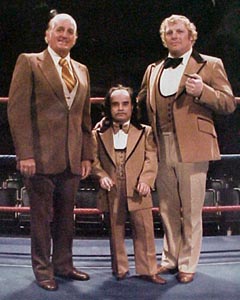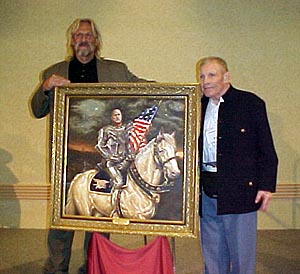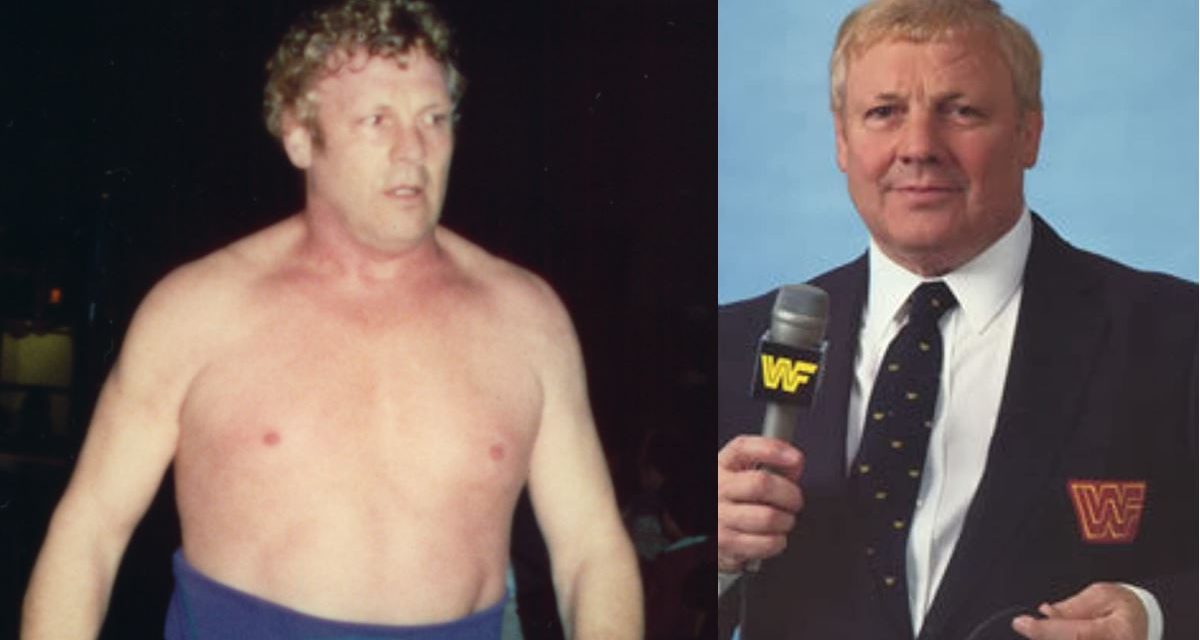Remembering Lord Alfred Hayes — who died Thursday, July 21, 2005, at age 76 — as just the buffoon second-banana on the WWF Tuesday Night Titans is to do a huge injustice to one of the greatest wrestlers ever to come out of the United Kingdom.
Sir Oliver Humperdink told SLAM! Wrestling that Hayes’ wrestling talent was often overlooked. “Al was a great worker. Not a lot of people know, but he was really a good hand. He was a fantastic worker.”

Three “Lords”: From left, Lord James Blears, Lord Littlebrook and Lord Alfred Hayes
Pat Patterson agreed. “In his heyday, he was a very good wrestler, very good.”
Beginning to wrestle in the early 1950s in Britain, the 5-foot-9, 238-pound “Judo” Al Hayes was a top-notch heel wherever he wrestled in the 1960s and 1970s, including the AWA, Florida, the Central States territory and Texas. He was usually billed as being from Windermere, England. One of his most notable feuds was a battle with Dory Funk Jr. over the NWA world title.
Patterson recalled hearing Lord Al Hayes on the radio in Minneapolis, and the hosts were teasing him about his name. The station called Scotland Yard to verify his pedigree. “They were trying to get through, and they asked the operator, ‘Are you aware of a Lord Alfred Hayes?’ ‘But of course we are!'” said Patterson with a laugh.
Then, in 1982, he joined the expanding WWF under Vince McMahon Jr., and upped the Britishness of his act. He was in countless skits on Tuesday Night Titans, The Bobby Heenan Show and the various WWF programs, as well as serving as commentator on matches on those shows.
He recalled the skits in a 2000 interview with the Wrestling Perspective newsletter. “Yeah, I didn’t mind doing those at all. They were good. One or two of them I didn’t because I didn’t want to and that was okay. Vince [McMahon] said, ‘Okay, we’ll get somebody else to do that.'”
In their book Sex, Lies & Headlocks, Shaun Assael and Mike Mooneyham described the Tuesday Night Titans premise. “From a shoestrong set with a boxy black-and-white skyline behind the talk show desk, [Vince McMahon] interviewed a parade of wrestlers as if they all lived in some parallel universe where everyone walked around in colored trunks, Arab headdresses, pink leisure suits, tribal feathers, and army fatigues. For a sidekick, he chose a diminutive British wrestler named Lord Alfred Hayes, who dressed in tuxedos and spoke with Masterpiece Theatre diction.”
Besides his work as a wrestler and announcer, Hayes served as a heel manager in the American Wrestling Association as well.
“I did some managing that I didn’t really want to do, but I did it up in Minneapolis. Verne Gagne persuaded me to,” Hayes said in Wrestling Perspective. “I said to him, ‘No, I don’t want to be a manager because when you’re a manager, you go in and you do the main event and the wrestler gets the money and you who do all the work and all the talking get nothing.’ So he said, ‘I’ll pay you what the main event gets.’ So that’s how much he wanted me to manage.”
Some of the names he managed included Billy Robinson, Nikolai Volkoff, Chris Markoff, Masked Superstar (Bill Eadie) and the Super Destroyers (Bob Remus, aka Sgt. Slaughter and Don Jardine).
In Florida, Hayes’ arrival as a manager in 1980 allowed for a (brief) Sir Oliver Humperdink babyface turn. SOH had been forced to be Dusty Rhodes’ valet following a loss by Ivan Koloff. In his absence from ringside as a manager, Hayes came in and started taking over the House of Humperdink. “After the 30 days were over, I told Al that I was back,” Humperdink recalled in an interview with the Mid-Atlantic Gateway website. “During the 30 days, Al had been associating with Bobby Jaggers and Nikolai Volkoff, and a couple of others. And Al said no way. And then Al Hayes slapped me!”
The wheel had been put in motion for a Humperdink-Hayes battle. “I even did a little program with Al Hayes, and we took that around the horn,” Humperdink said in the Gateway interview. “They hated Al and they loved me!” The contests between the two managers included Lights Out Death Matches and Bunkhouse Matches.
Pat Patterson was one of his close friends. “He was easy to be with. He liked to have a few drinks. He was fun to be with, just the way he talked, you just laughed so much. He never swore. He’d get mad, but when he’d get angry, he’d say, ‘I’m so angry at you, Pat,'” Patterson recalled for SLAM! Wrestling. “I taught him how to play golf, and he would talk to the ball and he’d also talk to the club. ‘Okay, my trusty nine-iron, please go where you are supposed to go.’ It was so fun. If I would miss a putt, he’d say, ‘Pat, a noble effort.'”
After his time in the WWF came to an end in 1995, he faced a number of health challenges, including arthritis. At the 2001 Cauliflower Alley Club reunion, he was in a wheelchair.

Steve Strong, left, and Lord Alfred Hayes stand beside Strong’s portrait of Jesse Ventura at the Cauliflower Alley Club reunion in Las Vegas in February 2001. — Greg Oliver, CANOE
For many years, Red Bastien has held an annual Texas Shootout wrestling dinner for his old colleagues, and Bastien said that Hayes was a regular up until his health kept him away the last couple of years. “He enjoyed them. He liked being around the boys,” said Bastien. “When I was in Dallas, I used to go visit him every once in a while.”
For the last number of years, Hayes lived on his own in Dallas, Texas. When a stubbed toe led to an infection, which led to gangrene, he had to have part of a leg amputated. This forced him to live in hospitals and rehab centers for the remainder of his life. A series of recent strokes are believed to be the cause of death at the Baylor Hospital.
RELATED LINK

